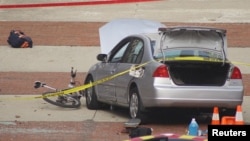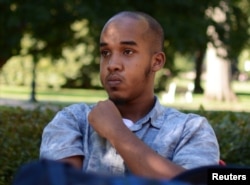The investigation into Monday's car-and-knife attack at Ohio State University has yet to find any evidence that Abdul Razak Ali Artan was acting on behalf of the Islamic State terror group.
"At this stage, we see no direct links to a terrorist organization," Homeland Security Secretary Jeh Johnson told an audience Wednesday in Washington.
"We see no communications, direct communications with a terrorist organization overseas, by this individual," Johnson added. "The indicators are right now that this was an act that was committed by someone who was self-radicalized."
IS claimed responsibility for the attack Tuesday, calling Artan, 20, a "soldier of the caliphate" in a statement through the group's Amaq News Agency.
The statement also claimed Artan was responding to calls to "target citizens of international coalition countries."
Motive not known
But at this point, investigators said they have yet to determine Artan's motive or whether the attack, which injured 11 people, was even premeditated. Artan was shot and killed at the scene by an Ohio State University police officer.
"They [IS] have been known to take credit for incidents like this when the assailant is deceased and cannot refute that," FBI Special Agent in Charge Angela Byers said during a news conference Wednesday in Columbus, Ohio.
Still, Byers said it did appear Artan was aware of IS propaganda, as well as the writings of other influential jihadist clerics.
"It appears that Artan may have at least been inspired by [al-Qaida leader] Anwar al-Awlaki and the Islamic State," Byers said.
IS recently issued a call for followers to carry out attacks using vehicles in its online Rumiyah magazine, but the FBI said it was not clear whether that was what gave Artan the idea.
"We don't know whether that's something that he's getting from something ISIS is putting out there or whether he's inspired by other attacks," Byers said.
The FBI also said that despite a Facebook post made just minutes before the attack in which Artan said he was willing to kill "a billion infidels" to stop America from "interfering with other countries," he had not been on the agency's radar.
"He was not a subject of any investigation," Byers said. "The FBI had no knowledge of him and had no contact with him."
Legal resident
Artan, a Somali-born refugee, was living as a legal permanent resident in the U.S. and was a freshman business student at Ohio State. He came to the U.S. in 2014 after spending several years in Pakistan.
But House Homeland Security Committee Chairman Mike McCaul, a Texas Republican, said Wednesday that it was quite possible Artan's apparent radical leanings developed much more recently.
"He did go through secondary screening because he was a military-aged male," McCaul said, appearing with DHS Secretary Johnson in Washington. "I do think he did radicalize in the United States."
Investigators are still poring through "several electronic media" found during a search of the house where Artan was living. A search of the vehicle, believed to belong to Artan's brother, is also underway.
Investigators are also asking for the public's help in determining Artan's movements on the morning of the attack.
Officials said Artan bought a knife at a local Wal-Mart store — which might have been the knife used in the attack — several hours before he drove into the crowd of people in front of the university's Watts Hall.
Meeting with family
Members of the Somali community in Columbus met Monday night with Artan's family.
Hassan Ali Omar, the chairman of the Somali Community Association of Ohio, told VOA the family spoke of feeling "at a loss and a lot of pain."
"They said he was a hardworking person who loved education. They said their son had good culture and that they were not expecting that he would do this kind of act," he said.
Columbus, Ohio, and Minneapolis, Minnesota, host the largest Somali communities in the United States.
In September, a Somali-American man stabbed 10 people at a mall in Minnesota before he was shot and killed by an off-duty police officer. Officials said the suspect asked some of his victims whether they were Muslim.
VOA Somali service's Harun Maruf contributed to this report.





